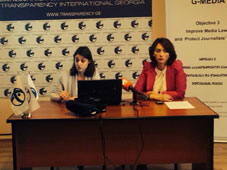
Who Owns Georgia’s Media?
By Gvantsa Gabekhadze
Thursday, April 17
Transparency International Georgia released new report entitled Who Owns Georgia’s Media on April 16. The report looks at the ownership of Georgia’s media outlets that have national coverage or reach large segments of the population, analyzes the background of shareholders and tries to shed light on their other business activities.
According to the report, it seeks to contribute to a better understanding of power networks and corporate relationships around major Georgian media outlets, because the audience should be able to understand who owns the media and which other businesses are linked to a particular outlet.
“Having this understanding is an important aspect of media literacy, allowing viewers, readers and listeners to better detect and understand any bias a media outlet might transport – not only any political or ideological spin, but also corporate interests that may be reflected and promoted by a specific media company,” the report reads.
According to the report, TI looked at the ownership of more than 20 broadcasting, print and online media outlets. “The ownership of Georgian media outlets is now largely transparent – a few smaller exceptions remain, where shareholders continue to hide their involvement behind offshore companies. According to the law, only the owners of the broadcasting licenses are banned from being registered in offshore locations,” the report reads.
According to the report, there are several large businesspeople who own media outlets in Georgia. For example, Levan Karamanishvili, one of the owners of Rustavi 2, owns shares in mobile operator Beeline through offshore entities. He is also linked to the ownership of internet provider Caucasus Online; Former Prime Minister Bidzina Ivanishvili, whose son Bera owns an entertaining station GDS, controls number of offshore companies through his relatives and so on.
According to report, following the 2012 parliamentary elections, certain media outlets went through ownership changes. For example, a few days after the elections, Georgian Media Production Group, a company that owns Imedi TV was returned to the family of Badri Patarkatsishvili.
The owners of several media outlets have or had some links with either the Georgian Dream coalition or the current opposition United National Movement. However much has improved over the past years in the areas of both ownership transparency and political control over the media, compared with pre-2011 situation, when some of the country’s most influential media outlets were closely linked with the government or other political groups and controlled them through opaque shell entities.
Also, several companies own more than one media outlet, though there are no apparent risks of market concentration.
TI plans to release a separate report which will focus on the ownership, role and financing of local media outlets, which in many cities, towns and communities across the country, play an important role in communicating and shaping local discussions and events. “Their role will further increase as a result of recent local government reform which will introduce the direct election of mayors in 12 cities in the June local elections,” the statement reads.


